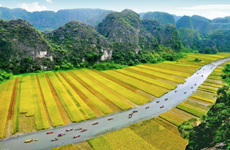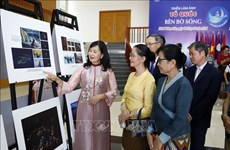Phu Tho looks forwards to an epitomised Hung Kings Temple festival
Concerted efforts were made by the northern midland province of Phu Tho
to hold a successful Hung Kings Temple festival in 2015 and make it an
epitomised festival nationwide, as heard at a conference to review the
festival’s organisation on May 13.
Concerted efforts were made by the northern midland province of Phu Tho
to hold a successful Hung Kings Temple festival in 2015 and make it an
epitomised festival nationwide, as heard at a conference to review the
festival’s organisation on May 13.
According to the organising board, comprehensive measures were effectively employed to ensure security, food sanitation, order and safety for the festival. Although the number of visitors to the festival saw a significant increase from previous years, there was no traffic congestion or blocked communication.
The results were underpinned by meticulous preparations, said Ha Ke San, Vice Chairman of the provincial People’s Committee and Head of the organising board.
He added that the province collaborated with Son La, Phu Yen, Dak Nong, Bac Lieu and Tien Giang to organise ceremonies and cultural activities paying tribute to the nation’s founders.
During the festival, nearly 1,000 policemen were mobilised to ensure security and 21 cameras were arranged to control the flow of traffic.
In addition, the successful festival was also spurred by a good promotion campaign. About 63 central and local press organisations attended and reported activities in the festival. Hundreds of pieces of news and reports were broadcasted on mass media, many of which featured Phu Tho’s two world cultural intangible heritages: the worshiping rituals of the Hung Kings and Xoan singing.
Vietnamese legend has it that Lac Long Quan, son of Kinh Duong Vuong, married Au Co, daughter of King De Lai. Au Co gave birth to a sack containing 100 eggs from which 100 children were born. The couple then decided to separate in order to populate the land and propagate the race, so half the children followed their mother to the highlands and the remaining went with their father to the sea.
The first child went with mother Au Co to Phong Chau, now Phu Tho province. He then became King Hung and founded the first nation in the history of Vietnam, called Van Lang.
Ruling the country over 18 generations, the Hung Kings taught the people how to grow wet rice. They chose Nghia Linh Mountain, the highest in the region, to perform rituals devoted to rice and sun deities to pray for lush crops.
To honour the great contributions of the Hung Kings, a complex of temples dedicated to them was built on Nghia Linh Mountain, and the tenth day of the third lunar month serves as the national commemorative anniversary.-VNA
According to the organising board, comprehensive measures were effectively employed to ensure security, food sanitation, order and safety for the festival. Although the number of visitors to the festival saw a significant increase from previous years, there was no traffic congestion or blocked communication.
The results were underpinned by meticulous preparations, said Ha Ke San, Vice Chairman of the provincial People’s Committee and Head of the organising board.
He added that the province collaborated with Son La, Phu Yen, Dak Nong, Bac Lieu and Tien Giang to organise ceremonies and cultural activities paying tribute to the nation’s founders.
During the festival, nearly 1,000 policemen were mobilised to ensure security and 21 cameras were arranged to control the flow of traffic.
In addition, the successful festival was also spurred by a good promotion campaign. About 63 central and local press organisations attended and reported activities in the festival. Hundreds of pieces of news and reports were broadcasted on mass media, many of which featured Phu Tho’s two world cultural intangible heritages: the worshiping rituals of the Hung Kings and Xoan singing.
Vietnamese legend has it that Lac Long Quan, son of Kinh Duong Vuong, married Au Co, daughter of King De Lai. Au Co gave birth to a sack containing 100 eggs from which 100 children were born. The couple then decided to separate in order to populate the land and propagate the race, so half the children followed their mother to the highlands and the remaining went with their father to the sea.
The first child went with mother Au Co to Phong Chau, now Phu Tho province. He then became King Hung and founded the first nation in the history of Vietnam, called Van Lang.
Ruling the country over 18 generations, the Hung Kings taught the people how to grow wet rice. They chose Nghia Linh Mountain, the highest in the region, to perform rituals devoted to rice and sun deities to pray for lush crops.
To honour the great contributions of the Hung Kings, a complex of temples dedicated to them was built on Nghia Linh Mountain, and the tenth day of the third lunar month serves as the national commemorative anniversary.-VNA













